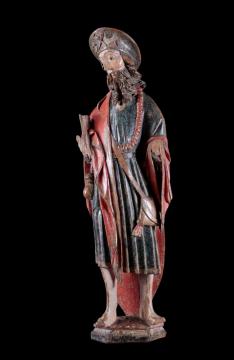Maître de Waha (the Master of Waha) was an exceptional sculptor and one of the most exceptional artists of the late Gothic style. Up to now, his identity is unknown, but we do know that he worked in the region of Marche at the start of the 16th century. His name refers to the village of Waha where most of his works were found.
This statue in polychromed oak was probably created around 1520-1530. The typically characteristic features of an expressive face, as in the regular curve of the eyebrows, the accentuated eyelids and the thin, straight nose, as well as the long, parallel pleats of the tunic folded back to the side, enable the work to be attributed to Maître de Waha.
Saint James Major was a disciple and apostle of Jesus and is represented here as the patron saint of pilgrims. He is wearing a large hat and has the characteristic attributes of a flask, two interlaced pilgrim’s staffs, a typical pilgrim’s cape and a scallop shell, known as the Saint James’s shell. The right hand of the statue has been partially destroyed, but one can make out a fragment of a pilgrim’s staff or stick. Logically, he would have been wearing sandals, but the artist chose to represent him barefoot. It is possible that this detail, rather like the evangeliary he is carrying under his right arm, aims to remind people that Saint James Major was also one of the apostles.
The cult of Saint James Major was very important during the Middle Ages and Namur was a significant stop on the road to Santiago de Compostella and yet the museums in Namur previously had no statues of Saint James Major. The acquisition of this statue thus fills a gap for the Musée Provincial des Arts Anciens du Namurois which, thanks to the arrival of the Treasure of Oignies (entrusted to the museum by the King Baudouin Foundation), has now become an official stopping place on the road to Santiago.
The statue will be officially presented and exhibited at the Church of Saint James in Namur on September 14 and 15, 2012.
